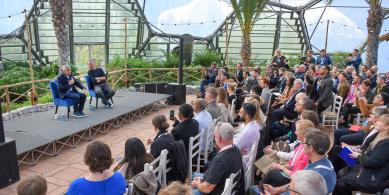No one is more enthusiastic than me about encouraging people in the workplace to generate and develop more ideas. If we are to tackle the myriad problems facing us all – as a country, as a company, as individuals – we need all the ideas we can get. The World Economic Forum at Davos in 2016 agreed that the most important skillsets going into the 2020’s will be Complex Problem Solving, Critical Thinking and Creativity. These are all activities with a high idea quotient.
Ideas are just as vital if we are going to take advantage of opportunities, but neither they, nor the problem-solving ones, have to be ones we have never used before.
Doctors use tried and tested ideas to diagnose our ailments and treat them. The lawyer’s first instinct is to research case law. The finest chefs use old recipes. If we have to drive three hundred miles to somewhere we have never visited, we tend to rely on our experience, and the strategies and techniques we trust.
So why do project teams in countless companies assume that only a freshly minted strategy will deliver the solution they desperately need to an apparently intractable problem?
I am not always slavishly appreciative of the academic approach of religiously researching and referencing. It can make for turgid prose and an overdose of footnotes. But at least these authors are being exhaustive, as well as respectful. Every time we travel and see a glorious view, we know that we are seeing what others saw before us.
If we collect non-fiction books on our shelves and eReaders (and I own hundreds and hundreds), we should consider ourselves blessed. Even before we trawl through Google for answers, we can access wise and sometimes brilliant ideas from authorities we admire and trust.
Meetings are such an intrusive scourge of time in most offices. Why don’t we resolve, the next time we are tasked with coming up with ideas, to start by trawling the ones we already know about? It is surely only a matter of time before a version of ULEZ is introduced to tax the pollution from unproductive and brain-sapping meetings in every conference room in the country. Before scheduling five weekly meetings, why not ask one or two bright navigators to research reusable ideas from the vast treasure house of wisdom we can all access?
And if we want to apply this thinking to Brexit, we would probably conclude that the disaster, chaos and sheer embarrassment of it all is down to an extreme paucity of new ideas and thinking – on all sides. It could hardly have been worse, and probably would have been a great deal better, with the use of some old, but sensible and constructive, ideas. Negotiating technique and alignment would have made a good start.
It’s still not too late!
This piece is by David Wethey, Owner of Agency Assessments International. His book 'The Very Idea' is available to purchase on Amazon.
Newsletter
Enjoy this? Get more.
Our monthly newsletter, The Edit, curates the very best of our latest content including articles, podcasts, video.
Become a member
Not a member yet?
Now it's time for you and your team to get involved. Get access to world-class events, exclusive publications, professional development, partner discounts and the chance to grow your network.




